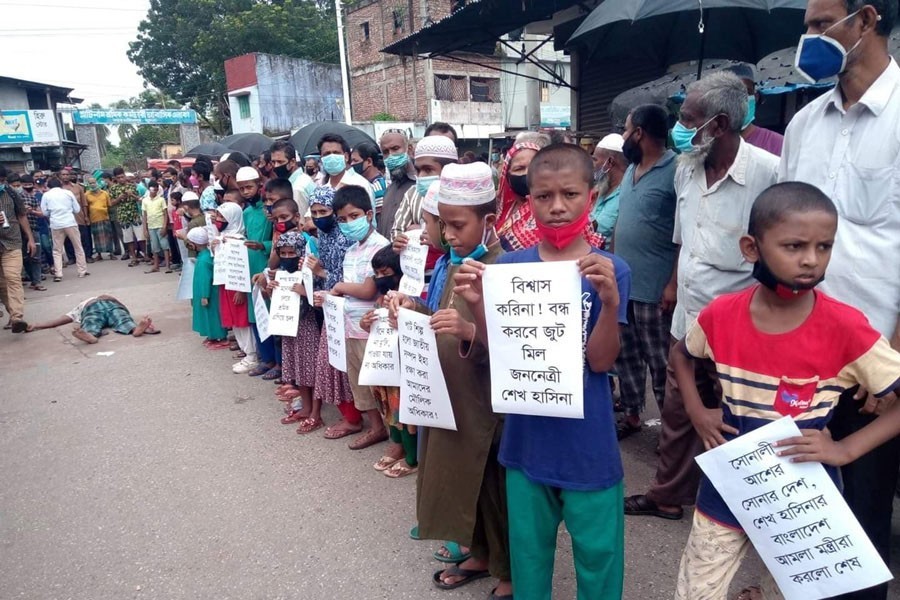Rehiring promise fails to allay fears of jute mill worker leaders

Published :
Updated :

The government promise that workers of the state jute mills being closed will get their jobs back once productions resume under public-private partnership has failed to allay fears among the leaders of worker unions, bdnews24.com reports.
They point out that many of the new owners of privatised mills had earlier recruited workers of their own choice while some others left Bangladesh by selling the factories and land altogether.
The lives of tens of thousands of workers and their families will be at risk if they are not re-employed amid the coronavirus crisis, the leaders fear.
Some have cast doubt over the payment of dues. The government has decided to pay most of the workers half the dues in cash and the rest in savings certificates.
Besides the 25,000 workers being sent on forced retirement, the 26 state-owned jute mills have around 26,000 workers who are paid on a daily basis.
“All of us will be jobless if the mills are privatised. Because the people who will lease the factories will appoint workers of their own choice,” said Zillur Rahman, the president of Rajshahi Jute Mills CBA.
Mahbubul Alam, a worker leader from Chattogram’s Hafiz Jute Mills who is acting as president of Bangladesh Jute Mill Workers League, said: “Many owners had left the country by selling the machinery and land. They did not pay the workers either.”
He threatened protest programmes, such as fast until death, if the workers are not paid properly.
The worker fronts of different political groups do not see any rationale behind the closure of the jute mills amid the pandemic.
The jute mills could have been saved had the government modernised the machinery, said Rajekuzzaman Ratan, the general secretary of Samajtantrik Sramik Front.
The move to put the jute mills under PPP is nothing but a ploy to embezzle state properties, alleged Kamrul Ahsan, the president of the Jatiya Sramik Federation.
Anwar Hossain, the president of Bangladesh Sramik Dal, said the young workers will be in a more uncertain state than their elderly colleagues due to the closure of the mills.
“Those who have six months or a year left to their job will be able to live on if they are paid the money they deserve. But what alternative do the young workers have now? Will they get their jobs back? Who will guarantee this?” he asked.
Shahidullah Chowdhury, the president of Bangladesh Trade Union Centre, wondered why the government would pay the workers Tk 50 billion instead of spending Tk 12 billion on balancing, modernisation, rehabilitation and expansion or BMRE.
“Can we expect proper payment from them?” he asked and threatened large protests if the workers are not paid.
‘PM has taken charge’
Textile and Jute Minister Golam Dastagir Gazi sought to assure the workers saying they will be “safe” as Prime Minister Sheikh Hasina has “taken charge of their welfare”.
At a press conference on Friday, Gazi said Hasina ordered officials to arrange training for the workers for their rehabilitation.
“Don’t neglect them because we don’t want to lose them,” the minister quoted Hasina as saying.
State Minister for Labour Monnujan Sufian said she hopes it will not take more than three months to reopen the mills.
“We are not closing the mills. We will reopen them within three to four months under PPE,” she told the news agency.
She argued that the mills need to be closed temporarily for BMRE.
Monnujan also said Hasina asked them to ensure irregularities-free payment of the workers.


 For all latest news, follow The Financial Express Google News channel.
For all latest news, follow The Financial Express Google News channel.